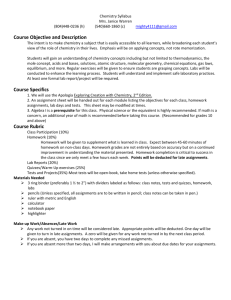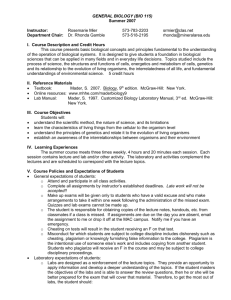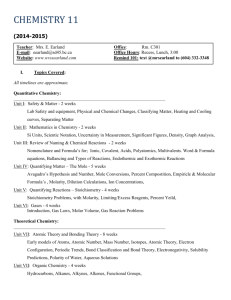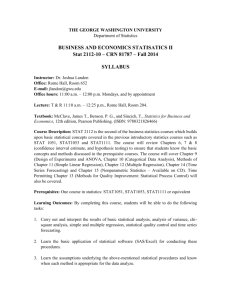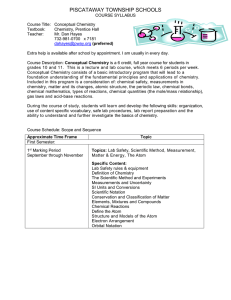Honors Chemistry Two Course Syllabus
advertisement
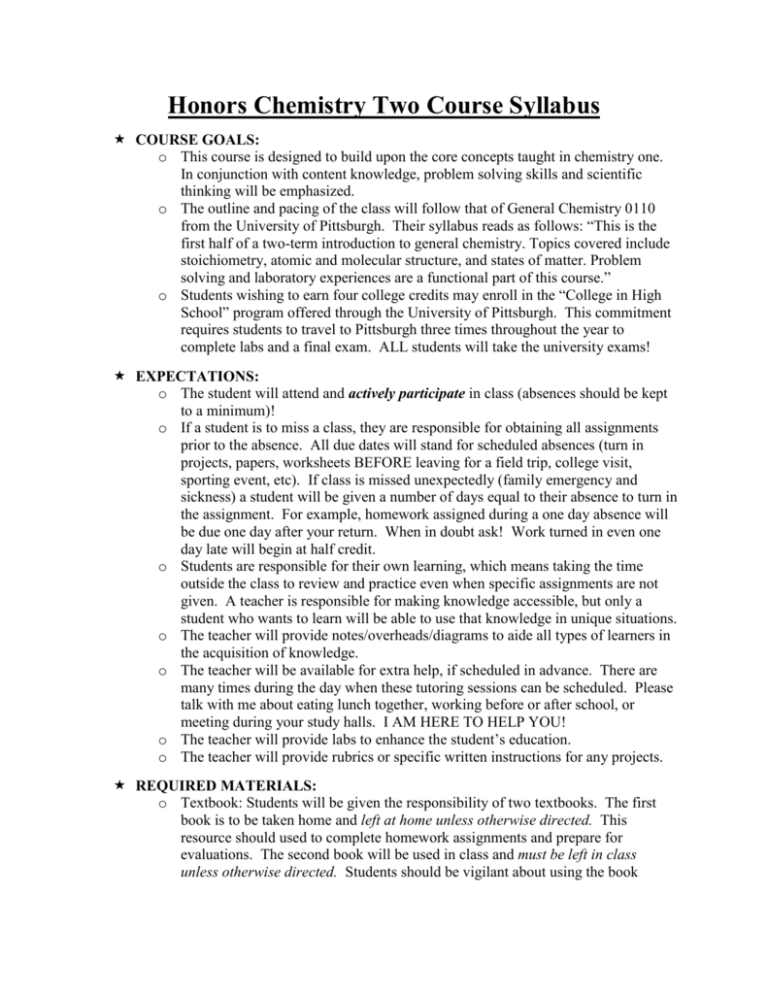
Honors Chemistry Two Course Syllabus COURSE GOALS: o This course is designed to build upon the core concepts taught in chemistry one. In conjunction with content knowledge, problem solving skills and scientific thinking will be emphasized. o The outline and pacing of the class will follow that of General Chemistry 0110 from the University of Pittsburgh. Their syllabus reads as follows: “This is the first half of a two-term introduction to general chemistry. Topics covered include stoichiometry, atomic and molecular structure, and states of matter. Problem solving and laboratory experiences are a functional part of this course.” o Students wishing to earn four college credits may enroll in the “College in High School” program offered through the University of Pittsburgh. This commitment requires students to travel to Pittsburgh three times throughout the year to complete labs and a final exam. ALL students will take the university exams! EXPECTATIONS: o The student will attend and actively participate in class (absences should be kept to a minimum)! o If a student is to miss a class, they are responsible for obtaining all assignments prior to the absence. All due dates will stand for scheduled absences (turn in projects, papers, worksheets BEFORE leaving for a field trip, college visit, sporting event, etc). If class is missed unexpectedly (family emergency and sickness) a student will be given a number of days equal to their absence to turn in the assignment. For example, homework assigned during a one day absence will be due one day after your return. When in doubt ask! Work turned in even one day late will begin at half credit. o Students are responsible for their own learning, which means taking the time outside the class to review and practice even when specific assignments are not given. A teacher is responsible for making knowledge accessible, but only a student who wants to learn will be able to use that knowledge in unique situations. o The teacher will provide notes/overheads/diagrams to aide all types of learners in the acquisition of knowledge. o The teacher will be available for extra help, if scheduled in advance. There are many times during the day when these tutoring sessions can be scheduled. Please talk with me about eating lunch together, working before or after school, or meeting during your study halls. I AM HERE TO HELP YOU! o The teacher will provide labs to enhance the student’s education. o The teacher will provide rubrics or specific written instructions for any projects. REQUIRED MATERIALS: o Textbook: Students will be given the responsibility of two textbooks. The first book is to be taken home and left at home unless otherwise directed. This resource should used to complete homework assignments and prepare for evaluations. The second book will be used in class and must be left in class unless otherwise directed. Students should be vigilant about using the book assigned to them, as they will be held responsible if the book goes missing or is damaged at the end of the year o Media Guide: In addition to the textbook, each student has the opportunity to use a CD media guide. This component is considered to be part of the book and is the property of Hollidaysburg High School. Students can use the CD to gain additional practice and tutorials on difficult material. I highly encourage students to spend some time at home exploring the resources available through the media guide. o In addition students are expected to bring a pencil and paper to class daily. I strongly suggest a three-ring binder to neatly store homework, labs, exams, etc. Notebooks are less desirable, because I often ask for class work or problem sets to be handed in. o Each student must have a scientific calculator or graphing calculator. If you do not have a calculator please see me to “rent” one for the year. Bring this calculator to class daily! OUTLINE: o Marking Period 1: Introduction and Background, Atomic Theory, Chemical Reactions, and Chemical Calculations. o Marking Period 2: Chemical Calculations, Gases and Kinetic Theory, Thermochemistry, and Electronic Structure o Marking Period 3: Electronic Structure and the Periodic Table, Chemical Bonding, Relationship between Phases, and Acids and Bases o Marking Period 4: Acids and Bases and Chemical Equilibrium o Major Exams: October, January, March, and May (specific dates TBA by your college professor, Dr. Golde) o Each of the 11 major categories shown above will include at least one lab or project to reinforce material in a hands on way. EVALUATIONS: o Tests/Quizzes: Tests or Quizzes are a written or spoken evaluation of your ability to retain and explain information discussed in class. Written tests/quizzes may include multiple choice, true/false, short answer, essay, or fill in the blank questions. Oral test/quizzes will require you to explain or discuss topics with me one-on-one or in small groups. I reserve the right to administer pop quizzes as necessary. o Labs: Grades from the lab will be based not only on follow up questions but also on your behavior and ability to read or follow directions that are given in class or written on lab hand-outs. o Practicals: Practicals are an assessment of your ability to perform subject related tasks. For example: After learning to titrate, I will evaluate your ability to dispense one drop from a standard buret. Practicals can happen during any laboratory exercise. They may or may not be announced ahead of time. Be sure to ask questions about techniques or instructions before beginning the lab. Once you begin it is assumed that you have no further questions about the procedures. o Projects: Assignments will encourage students to use creative and artistic skills. o Homework: Assignments will be given on a regular basis. Problem sets for each chapter will be collected and randomly checked for accuracy. Occasionally homework will be collected without prior warning. o In-Class Assignments: This category contains a wide variety of activities. Examples of these activities include warm-up problems, worksheets, or class discussions. GENERAL CLASSROOM EXPECTATIONS: o My emphasis falls to one main idea, RESPECT. When you respect yourself, others, and me there is no need for a lengthy list of do’s and don’ts. ACADEMIC HONESTY o When you are completing assignments make sure the work is entirely your own. Formal citations are not necessary for most assignments, but remember to give credit where credit is due (according to, as said by, etc). Changing numbers in lab, copying homework/labs, cheating on a test, or in any way representing someone else’s work as your own constitutes academic dishonesty. Penalties for such behavior will be determined on an individual basis.
